Successful Social Relations in a Changing World: Employee Benefits
VerifiedAdded on 2020/05/28
|7
|1767
|323
Essay
AI Summary
This essay examines the common theme of successful social relations and its impact on employee development, focusing on the interconnectedness of philosophy, psychology, and interpersonal communication. The introduction highlights how these three modules – philosophy, psychology, and interpersonal communication – contribute to an individual's success in the workplace. The discussion section delves into philosophy, emphasizing the significance of morality and ethics in fostering positive social interactions, referencing the philosophical perspectives of Andre Comte-Sponville and the importance of normative ethical theory. The essay then explores the psychological aspects, emphasizing the importance of understanding behavior and mental processes, including Social Learning Theory by Albert Bandura. Finally, it analyzes interpersonal communication, highlighting its role in meeting social and instrumental needs and supporting career success, as well as referencing Maslow's hierarchy of needs. The essay concludes by reiterating the impact of all three modules on successful social relations and employee betterment.
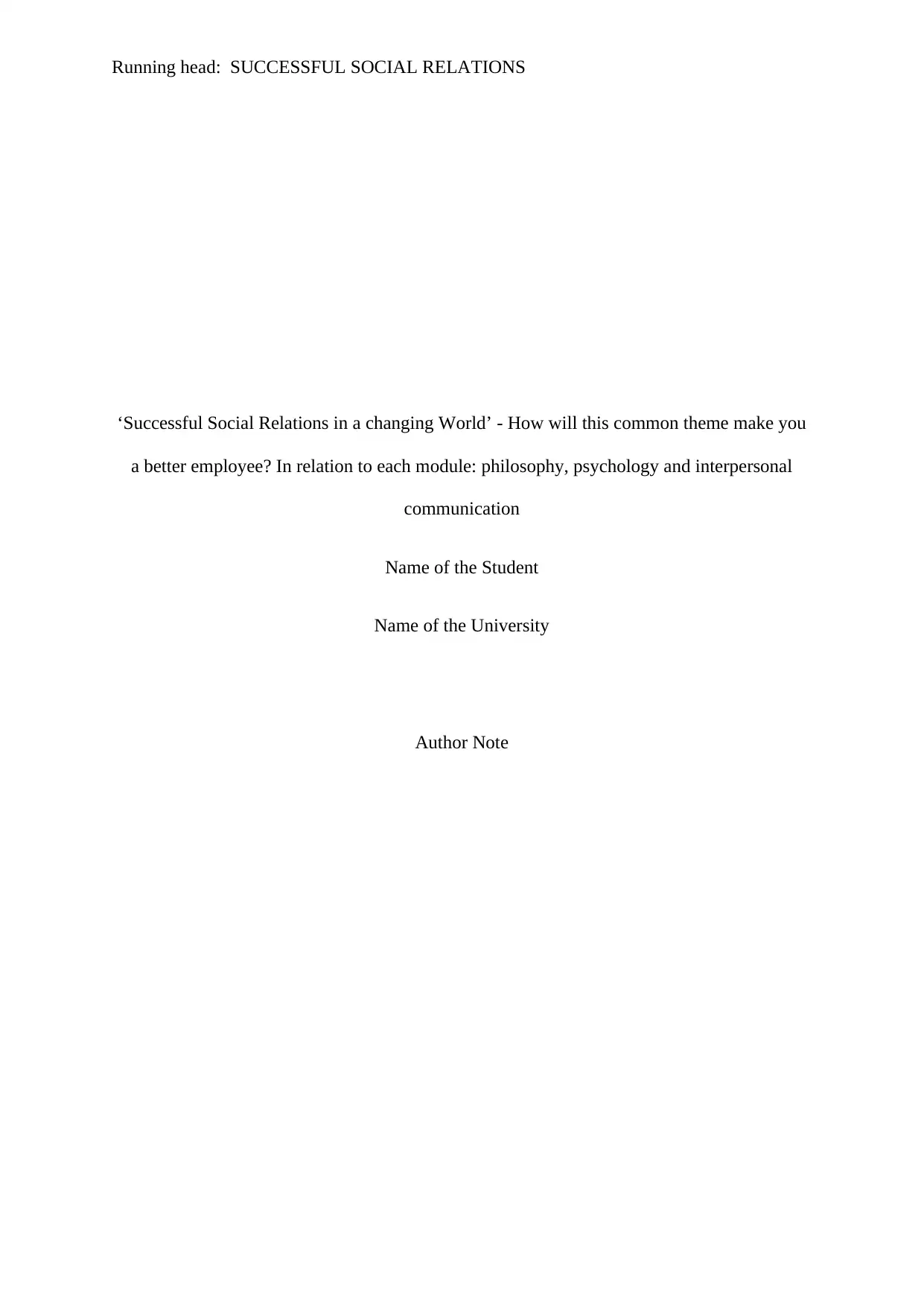
Running head: SUCCESSFUL SOCIAL RELATIONS
‘Successful Social Relations in a changing World’ - How will this common theme make you
a better employee? In relation to each module: philosophy, psychology and interpersonal
communication
Name of the Student
Name of the University
Author Note
‘Successful Social Relations in a changing World’ - How will this common theme make you
a better employee? In relation to each module: philosophy, psychology and interpersonal
communication
Name of the Student
Name of the University
Author Note
Paraphrase This Document
Need a fresh take? Get an instant paraphrase of this document with our AI Paraphraser
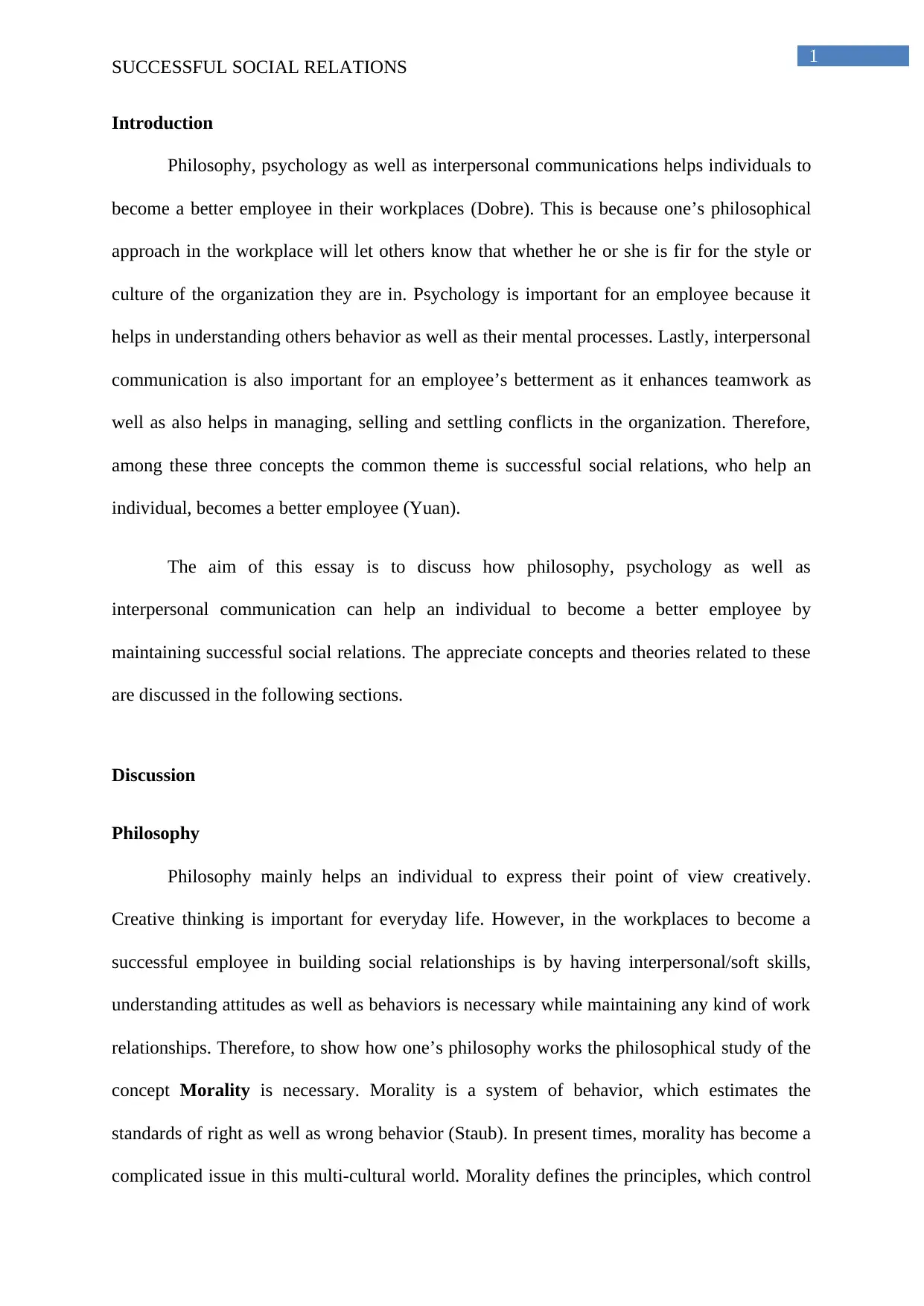
1
SUCCESSFUL SOCIAL RELATIONS
Introduction
Philosophy, psychology as well as interpersonal communications helps individuals to
become a better employee in their workplaces (Dobre). This is because one’s philosophical
approach in the workplace will let others know that whether he or she is fir for the style or
culture of the organization they are in. Psychology is important for an employee because it
helps in understanding others behavior as well as their mental processes. Lastly, interpersonal
communication is also important for an employee’s betterment as it enhances teamwork as
well as also helps in managing, selling and settling conflicts in the organization. Therefore,
among these three concepts the common theme is successful social relations, who help an
individual, becomes a better employee (Yuan).
The aim of this essay is to discuss how philosophy, psychology as well as
interpersonal communication can help an individual to become a better employee by
maintaining successful social relations. The appreciate concepts and theories related to these
are discussed in the following sections.
Discussion
Philosophy
Philosophy mainly helps an individual to express their point of view creatively.
Creative thinking is important for everyday life. However, in the workplaces to become a
successful employee in building social relationships is by having interpersonal/soft skills,
understanding attitudes as well as behaviors is necessary while maintaining any kind of work
relationships. Therefore, to show how one’s philosophy works the philosophical study of the
concept Morality is necessary. Morality is a system of behavior, which estimates the
standards of right as well as wrong behavior (Staub). In present times, morality has become a
complicated issue in this multi-cultural world. Morality defines the principles, which control
SUCCESSFUL SOCIAL RELATIONS
Introduction
Philosophy, psychology as well as interpersonal communications helps individuals to
become a better employee in their workplaces (Dobre). This is because one’s philosophical
approach in the workplace will let others know that whether he or she is fir for the style or
culture of the organization they are in. Psychology is important for an employee because it
helps in understanding others behavior as well as their mental processes. Lastly, interpersonal
communication is also important for an employee’s betterment as it enhances teamwork as
well as also helps in managing, selling and settling conflicts in the organization. Therefore,
among these three concepts the common theme is successful social relations, who help an
individual, becomes a better employee (Yuan).
The aim of this essay is to discuss how philosophy, psychology as well as
interpersonal communication can help an individual to become a better employee by
maintaining successful social relations. The appreciate concepts and theories related to these
are discussed in the following sections.
Discussion
Philosophy
Philosophy mainly helps an individual to express their point of view creatively.
Creative thinking is important for everyday life. However, in the workplaces to become a
successful employee in building social relationships is by having interpersonal/soft skills,
understanding attitudes as well as behaviors is necessary while maintaining any kind of work
relationships. Therefore, to show how one’s philosophy works the philosophical study of the
concept Morality is necessary. Morality is a system of behavior, which estimates the
standards of right as well as wrong behavior (Staub). In present times, morality has become a
complicated issue in this multi-cultural world. Morality defines the principles, which control
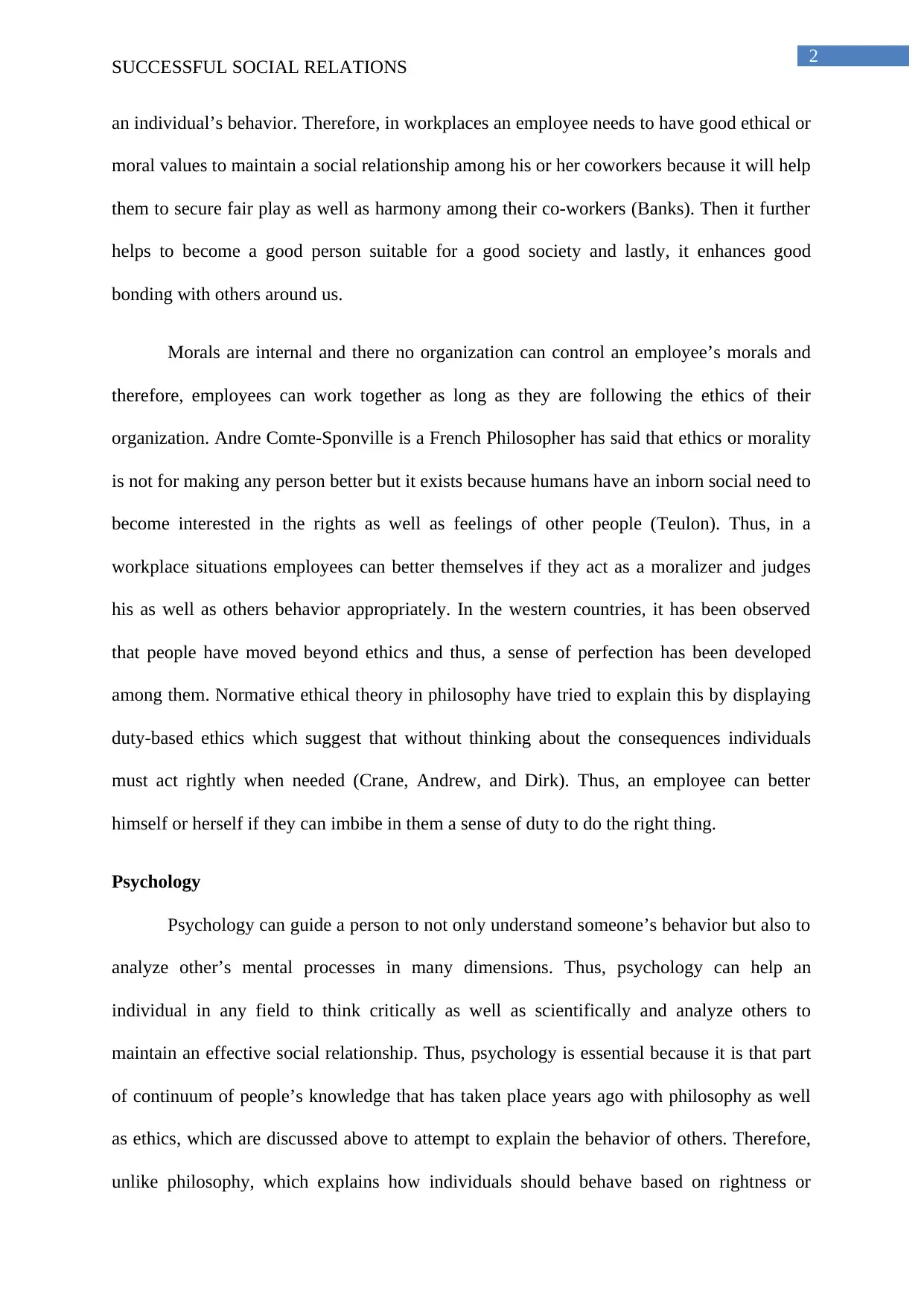
2
SUCCESSFUL SOCIAL RELATIONS
an individual’s behavior. Therefore, in workplaces an employee needs to have good ethical or
moral values to maintain a social relationship among his or her coworkers because it will help
them to secure fair play as well as harmony among their co-workers (Banks). Then it further
helps to become a good person suitable for a good society and lastly, it enhances good
bonding with others around us.
Morals are internal and there no organization can control an employee’s morals and
therefore, employees can work together as long as they are following the ethics of their
organization. Andre Comte-Sponville is a French Philosopher has said that ethics or morality
is not for making any person better but it exists because humans have an inborn social need to
become interested in the rights as well as feelings of other people (Teulon). Thus, in a
workplace situations employees can better themselves if they act as a moralizer and judges
his as well as others behavior appropriately. In the western countries, it has been observed
that people have moved beyond ethics and thus, a sense of perfection has been developed
among them. Normative ethical theory in philosophy have tried to explain this by displaying
duty-based ethics which suggest that without thinking about the consequences individuals
must act rightly when needed (Crane, Andrew, and Dirk). Thus, an employee can better
himself or herself if they can imbibe in them a sense of duty to do the right thing.
Psychology
Psychology can guide a person to not only understand someone’s behavior but also to
analyze other’s mental processes in many dimensions. Thus, psychology can help an
individual in any field to think critically as well as scientifically and analyze others to
maintain an effective social relationship. Thus, psychology is essential because it is that part
of continuum of people’s knowledge that has taken place years ago with philosophy as well
as ethics, which are discussed above to attempt to explain the behavior of others. Therefore,
unlike philosophy, which explains how individuals should behave based on rightness or
SUCCESSFUL SOCIAL RELATIONS
an individual’s behavior. Therefore, in workplaces an employee needs to have good ethical or
moral values to maintain a social relationship among his or her coworkers because it will help
them to secure fair play as well as harmony among their co-workers (Banks). Then it further
helps to become a good person suitable for a good society and lastly, it enhances good
bonding with others around us.
Morals are internal and there no organization can control an employee’s morals and
therefore, employees can work together as long as they are following the ethics of their
organization. Andre Comte-Sponville is a French Philosopher has said that ethics or morality
is not for making any person better but it exists because humans have an inborn social need to
become interested in the rights as well as feelings of other people (Teulon). Thus, in a
workplace situations employees can better themselves if they act as a moralizer and judges
his as well as others behavior appropriately. In the western countries, it has been observed
that people have moved beyond ethics and thus, a sense of perfection has been developed
among them. Normative ethical theory in philosophy have tried to explain this by displaying
duty-based ethics which suggest that without thinking about the consequences individuals
must act rightly when needed (Crane, Andrew, and Dirk). Thus, an employee can better
himself or herself if they can imbibe in them a sense of duty to do the right thing.
Psychology
Psychology can guide a person to not only understand someone’s behavior but also to
analyze other’s mental processes in many dimensions. Thus, psychology can help an
individual in any field to think critically as well as scientifically and analyze others to
maintain an effective social relationship. Thus, psychology is essential because it is that part
of continuum of people’s knowledge that has taken place years ago with philosophy as well
as ethics, which are discussed above to attempt to explain the behavior of others. Therefore,
unlike philosophy, which explains how individuals should behave based on rightness or
⊘ This is a preview!⊘
Do you want full access?
Subscribe today to unlock all pages.

Trusted by 1+ million students worldwide
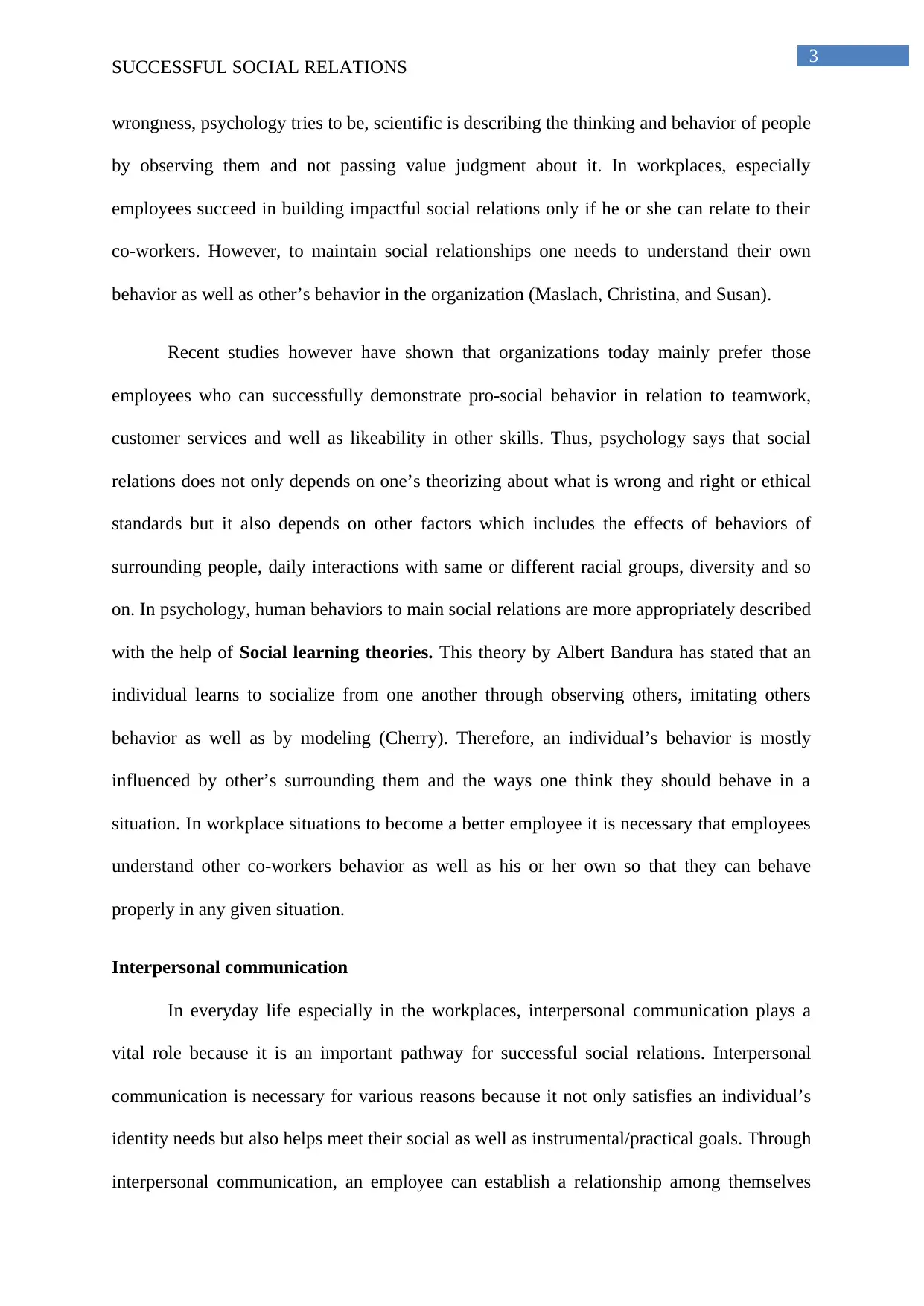
3
SUCCESSFUL SOCIAL RELATIONS
wrongness, psychology tries to be, scientific is describing the thinking and behavior of people
by observing them and not passing value judgment about it. In workplaces, especially
employees succeed in building impactful social relations only if he or she can relate to their
co-workers. However, to maintain social relationships one needs to understand their own
behavior as well as other’s behavior in the organization (Maslach, Christina, and Susan).
Recent studies however have shown that organizations today mainly prefer those
employees who can successfully demonstrate pro-social behavior in relation to teamwork,
customer services and well as likeability in other skills. Thus, psychology says that social
relations does not only depends on one’s theorizing about what is wrong and right or ethical
standards but it also depends on other factors which includes the effects of behaviors of
surrounding people, daily interactions with same or different racial groups, diversity and so
on. In psychology, human behaviors to main social relations are more appropriately described
with the help of Social learning theories. This theory by Albert Bandura has stated that an
individual learns to socialize from one another through observing others, imitating others
behavior as well as by modeling (Cherry). Therefore, an individual’s behavior is mostly
influenced by other’s surrounding them and the ways one think they should behave in a
situation. In workplace situations to become a better employee it is necessary that employees
understand other co-workers behavior as well as his or her own so that they can behave
properly in any given situation.
Interpersonal communication
In everyday life especially in the workplaces, interpersonal communication plays a
vital role because it is an important pathway for successful social relations. Interpersonal
communication is necessary for various reasons because it not only satisfies an individual’s
identity needs but also helps meet their social as well as instrumental/practical goals. Through
interpersonal communication, an employee can establish a relationship among themselves
SUCCESSFUL SOCIAL RELATIONS
wrongness, psychology tries to be, scientific is describing the thinking and behavior of people
by observing them and not passing value judgment about it. In workplaces, especially
employees succeed in building impactful social relations only if he or she can relate to their
co-workers. However, to maintain social relationships one needs to understand their own
behavior as well as other’s behavior in the organization (Maslach, Christina, and Susan).
Recent studies however have shown that organizations today mainly prefer those
employees who can successfully demonstrate pro-social behavior in relation to teamwork,
customer services and well as likeability in other skills. Thus, psychology says that social
relations does not only depends on one’s theorizing about what is wrong and right or ethical
standards but it also depends on other factors which includes the effects of behaviors of
surrounding people, daily interactions with same or different racial groups, diversity and so
on. In psychology, human behaviors to main social relations are more appropriately described
with the help of Social learning theories. This theory by Albert Bandura has stated that an
individual learns to socialize from one another through observing others, imitating others
behavior as well as by modeling (Cherry). Therefore, an individual’s behavior is mostly
influenced by other’s surrounding them and the ways one think they should behave in a
situation. In workplace situations to become a better employee it is necessary that employees
understand other co-workers behavior as well as his or her own so that they can behave
properly in any given situation.
Interpersonal communication
In everyday life especially in the workplaces, interpersonal communication plays a
vital role because it is an important pathway for successful social relations. Interpersonal
communication is necessary for various reasons because it not only satisfies an individual’s
identity needs but also helps meet their social as well as instrumental/practical goals. Through
interpersonal communication, an employee can establish a relationship among themselves
Paraphrase This Document
Need a fresh take? Get an instant paraphrase of this document with our AI Paraphraser
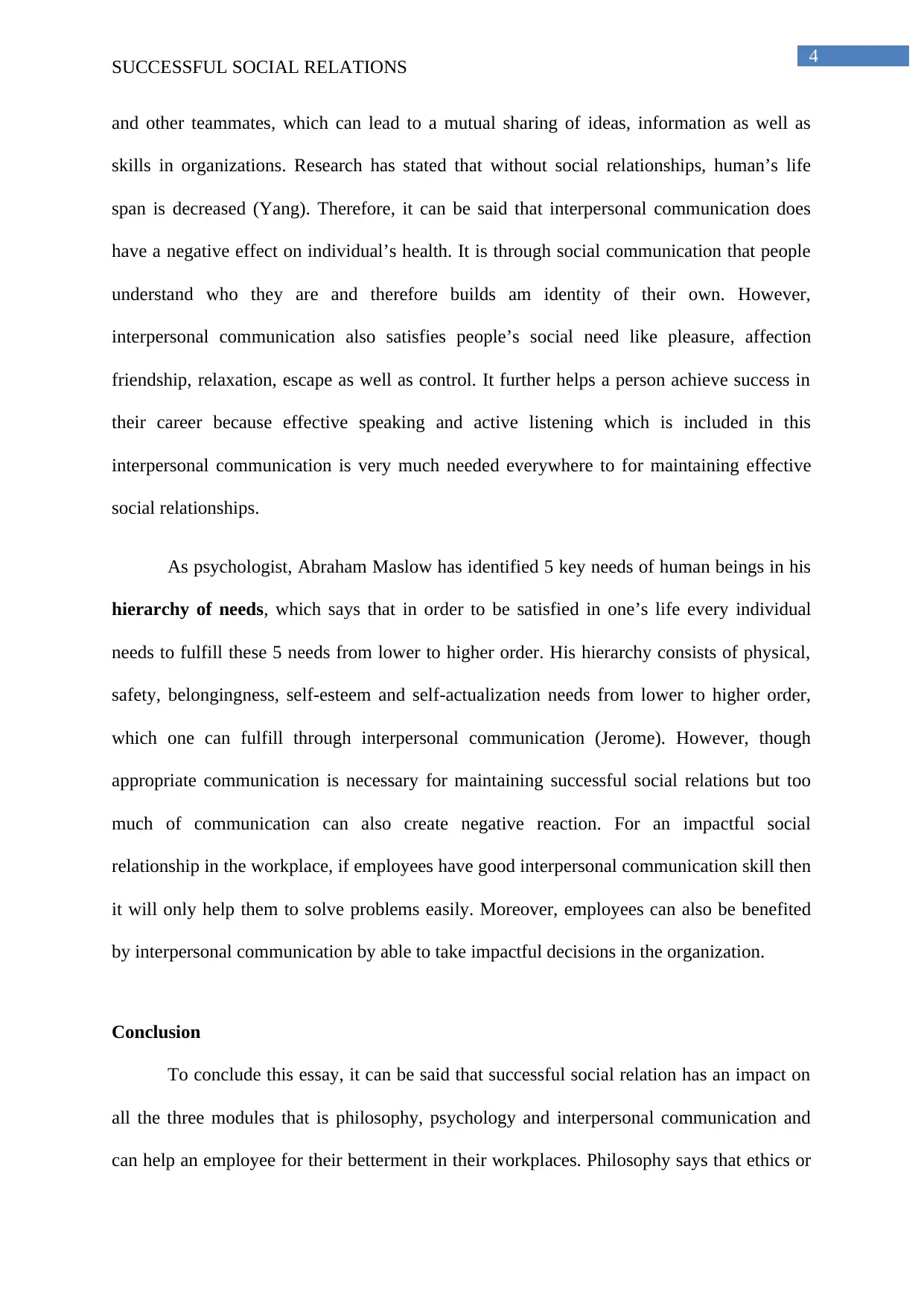
4
SUCCESSFUL SOCIAL RELATIONS
and other teammates, which can lead to a mutual sharing of ideas, information as well as
skills in organizations. Research has stated that without social relationships, human’s life
span is decreased (Yang). Therefore, it can be said that interpersonal communication does
have a negative effect on individual’s health. It is through social communication that people
understand who they are and therefore builds am identity of their own. However,
interpersonal communication also satisfies people’s social need like pleasure, affection
friendship, relaxation, escape as well as control. It further helps a person achieve success in
their career because effective speaking and active listening which is included in this
interpersonal communication is very much needed everywhere to for maintaining effective
social relationships.
As psychologist, Abraham Maslow has identified 5 key needs of human beings in his
hierarchy of needs, which says that in order to be satisfied in one’s life every individual
needs to fulfill these 5 needs from lower to higher order. His hierarchy consists of physical,
safety, belongingness, self-esteem and self-actualization needs from lower to higher order,
which one can fulfill through interpersonal communication (Jerome). However, though
appropriate communication is necessary for maintaining successful social relations but too
much of communication can also create negative reaction. For an impactful social
relationship in the workplace, if employees have good interpersonal communication skill then
it will only help them to solve problems easily. Moreover, employees can also be benefited
by interpersonal communication by able to take impactful decisions in the organization.
Conclusion
To conclude this essay, it can be said that successful social relation has an impact on
all the three modules that is philosophy, psychology and interpersonal communication and
can help an employee for their betterment in their workplaces. Philosophy says that ethics or
SUCCESSFUL SOCIAL RELATIONS
and other teammates, which can lead to a mutual sharing of ideas, information as well as
skills in organizations. Research has stated that without social relationships, human’s life
span is decreased (Yang). Therefore, it can be said that interpersonal communication does
have a negative effect on individual’s health. It is through social communication that people
understand who they are and therefore builds am identity of their own. However,
interpersonal communication also satisfies people’s social need like pleasure, affection
friendship, relaxation, escape as well as control. It further helps a person achieve success in
their career because effective speaking and active listening which is included in this
interpersonal communication is very much needed everywhere to for maintaining effective
social relationships.
As psychologist, Abraham Maslow has identified 5 key needs of human beings in his
hierarchy of needs, which says that in order to be satisfied in one’s life every individual
needs to fulfill these 5 needs from lower to higher order. His hierarchy consists of physical,
safety, belongingness, self-esteem and self-actualization needs from lower to higher order,
which one can fulfill through interpersonal communication (Jerome). However, though
appropriate communication is necessary for maintaining successful social relations but too
much of communication can also create negative reaction. For an impactful social
relationship in the workplace, if employees have good interpersonal communication skill then
it will only help them to solve problems easily. Moreover, employees can also be benefited
by interpersonal communication by able to take impactful decisions in the organization.
Conclusion
To conclude this essay, it can be said that successful social relation has an impact on
all the three modules that is philosophy, psychology and interpersonal communication and
can help an employee for their betterment in their workplaces. Philosophy says that ethics or

5
SUCCESSFUL SOCIAL RELATIONS
morality is important in a human for successful social relationship. However, psychology
believes that individual should analyze their own as well as others behavior and thinking in
any given situation to maintain successful social relations. Lastly, another important factor is
of interpersonal communication because this only satisfies an individual’s identity as well as
social needs, which has also supported by Abraham Maslow.
SUCCESSFUL SOCIAL RELATIONS
morality is important in a human for successful social relationship. However, psychology
believes that individual should analyze their own as well as others behavior and thinking in
any given situation to maintain successful social relations. Lastly, another important factor is
of interpersonal communication because this only satisfies an individual’s identity as well as
social needs, which has also supported by Abraham Maslow.
⊘ This is a preview!⊘
Do you want full access?
Subscribe today to unlock all pages.

Trusted by 1+ million students worldwide
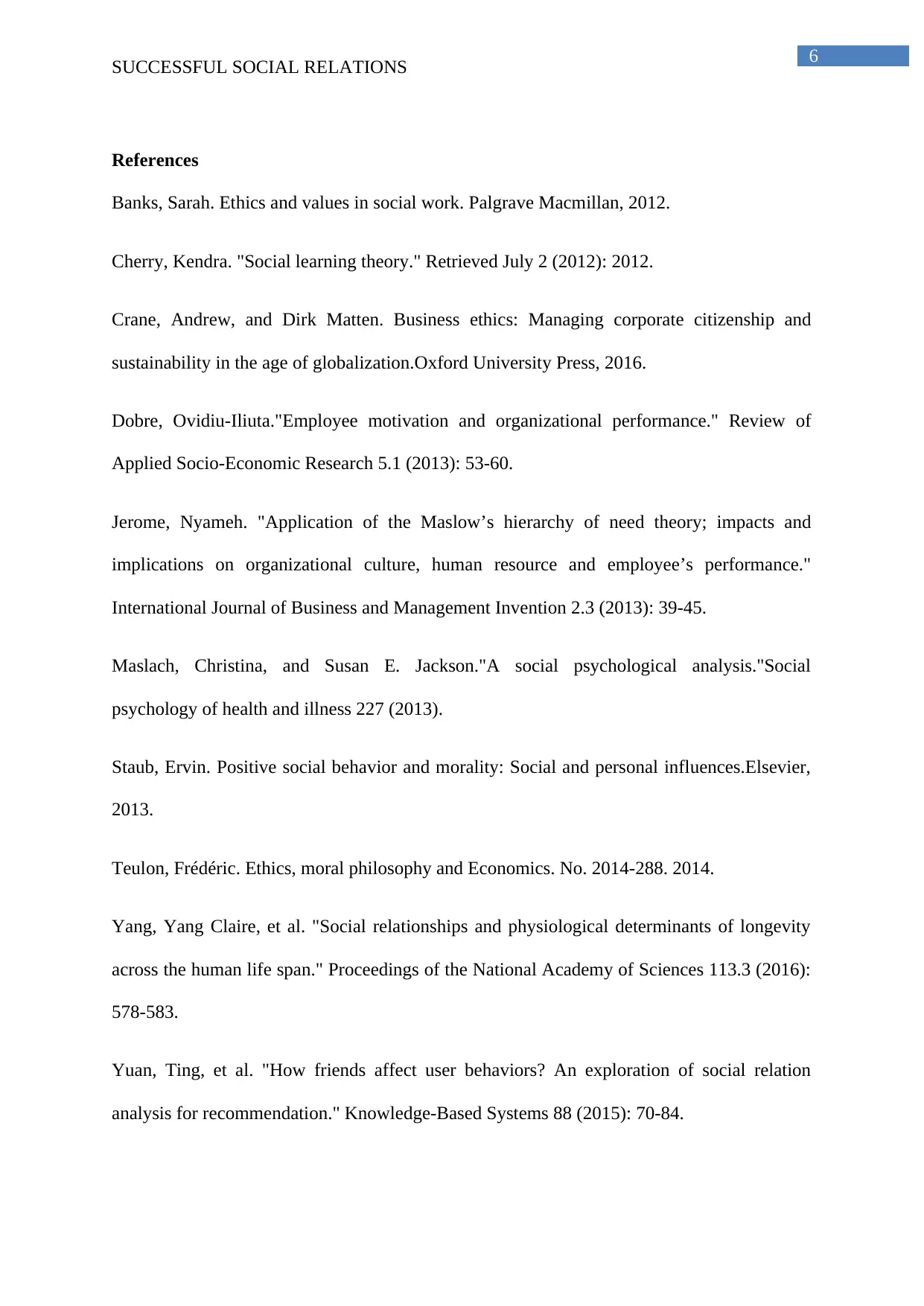
6
SUCCESSFUL SOCIAL RELATIONS
References
Banks, Sarah. Ethics and values in social work. Palgrave Macmillan, 2012.
Cherry, Kendra. "Social learning theory." Retrieved July 2 (2012): 2012.
Crane, Andrew, and Dirk Matten. Business ethics: Managing corporate citizenship and
sustainability in the age of globalization.Oxford University Press, 2016.
Dobre, Ovidiu-Iliuta."Employee motivation and organizational performance." Review of
Applied Socio-Economic Research 5.1 (2013): 53-60.
Jerome, Nyameh. "Application of the Maslow’s hierarchy of need theory; impacts and
implications on organizational culture, human resource and employee’s performance."
International Journal of Business and Management Invention 2.3 (2013): 39-45.
Maslach, Christina, and Susan E. Jackson."A social psychological analysis."Social
psychology of health and illness 227 (2013).
Staub, Ervin. Positive social behavior and morality: Social and personal influences.Elsevier,
2013.
Teulon, Frédéric. Ethics, moral philosophy and Economics. No. 2014-288. 2014.
Yang, Yang Claire, et al. "Social relationships and physiological determinants of longevity
across the human life span." Proceedings of the National Academy of Sciences 113.3 (2016):
578-583.
Yuan, Ting, et al. "How friends affect user behaviors? An exploration of social relation
analysis for recommendation." Knowledge-Based Systems 88 (2015): 70-84.
SUCCESSFUL SOCIAL RELATIONS
References
Banks, Sarah. Ethics and values in social work. Palgrave Macmillan, 2012.
Cherry, Kendra. "Social learning theory." Retrieved July 2 (2012): 2012.
Crane, Andrew, and Dirk Matten. Business ethics: Managing corporate citizenship and
sustainability in the age of globalization.Oxford University Press, 2016.
Dobre, Ovidiu-Iliuta."Employee motivation and organizational performance." Review of
Applied Socio-Economic Research 5.1 (2013): 53-60.
Jerome, Nyameh. "Application of the Maslow’s hierarchy of need theory; impacts and
implications on organizational culture, human resource and employee’s performance."
International Journal of Business and Management Invention 2.3 (2013): 39-45.
Maslach, Christina, and Susan E. Jackson."A social psychological analysis."Social
psychology of health and illness 227 (2013).
Staub, Ervin. Positive social behavior and morality: Social and personal influences.Elsevier,
2013.
Teulon, Frédéric. Ethics, moral philosophy and Economics. No. 2014-288. 2014.
Yang, Yang Claire, et al. "Social relationships and physiological determinants of longevity
across the human life span." Proceedings of the National Academy of Sciences 113.3 (2016):
578-583.
Yuan, Ting, et al. "How friends affect user behaviors? An exploration of social relation
analysis for recommendation." Knowledge-Based Systems 88 (2015): 70-84.
1 out of 7
Related Documents
Your All-in-One AI-Powered Toolkit for Academic Success.
+13062052269
info@desklib.com
Available 24*7 on WhatsApp / Email
![[object Object]](/_next/static/media/star-bottom.7253800d.svg)
Unlock your academic potential
Copyright © 2020–2026 A2Z Services. All Rights Reserved. Developed and managed by ZUCOL.





